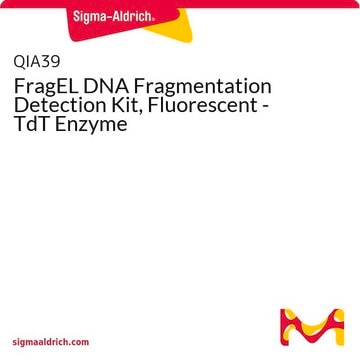ADD670C
HepaRG™ Thawing and Plating Medium Supplement with Antibiotics
Sign Into View Organizational & Contract Pricing
All Photos(1)
About This Item
UNSPSC Code:
12352207
NACRES:
NA.71
Recommended Products
form
liquid
shipped in
dry ice
storage temp.
−20°C
General description
Biopredic′s HepaRG Thawing and Plating Medium Supplement with Antibiotics can be used with all HepaRG cell lines.
HepaRG™ cells have the unique properties of maintaining significant levels of hepatic cell functions, of being CYP450 inducible, and supporting the complete replicative cycle of HBV.
HepaRG™ cells have the unique properties of maintaining significant levels of hepatic cell functions, of being CYP450 inducible, and supporting the complete replicative cycle of HBV.
HepaRG™ cells have the unique properties of maintaining significant levels of hepatic cell functions, being cytochrome P450 (CYP450) inducible, and supporting the complete replicative cycle of hepatitis B virus (HBV).
Application
HepaRG™ Thawing and Plating Medium Supplement with Antibiotics has been used as a supplement to culture HepaRG cells.
Legal Information
Use of this product is subject to one or more license agreements.
HepaRG cells are patented and their use is strictly limited; consider the cells as a single use, disposable product that must be destroyed upon conclusion of a study or experiment. Propagating, reproducing, cloning, subcloning or any other use of the cells following the conclusion of a study is prohibited. Use of the cells to produce or manufacture commercial products for general sale or for use in the manufacture of products intended for general sale is prohibited. Transfer of the cells to anyone not employed within the same organization, whether for financial benefit or not, is prohibited. If you are unwilling to accept the terms of this LIMITED USE LICENSE, do not ORDER or use them and immediately return the cells for credit. Violators of this Limited Use Licesense will be prosecuted to the fullest extent of the law.
HepaRG cells are patented and their use is strictly limited; consider the cells as a single use, disposable product that must be destroyed upon conclusion of a study or experiment. Propagating, reproducing, cloning, subcloning or any other use of the cells following the conclusion of a study is prohibited. Use of the cells to produce or manufacture commercial products for general sale or for use in the manufacture of products intended for general sale is prohibited. Transfer of the cells to anyone not employed within the same organization, whether for financial benefit or not, is prohibited. If you are unwilling to accept the terms of this LIMITED USE LICENSE, do not ORDER or use them and immediately return the cells for credit. Violators of this Limited Use Licesense will be prosecuted to the fullest extent of the law.
HepaRG is a trademark of BioPredic International company
Signal Word
Warning
Hazard Statements
Precautionary Statements
Hazard Classifications
Repr. 2
Storage Class Code
12 - Non Combustible Liquids
WGK
WGK 3
Flash Point(F)
Not applicable
Flash Point(C)
Not applicable
Choose from one of the most recent versions:
Certificates of Analysis (COA)
Lot/Batch Number
Sorry, we don't have COAs for this product available online at this time.
If you need assistance, please contact Customer Support.
Already Own This Product?
Find documentation for the products that you have recently purchased in the Document Library.
Customers Also Viewed
Robin Mesnage et al.
Toxicology reports, 5, 819-826 (2018-08-22)
Use and thus exposure to quizalofop-p-ethyl, isoxaflutole, mesotrione and glyphosate, which are declared as active principles in commercial formulations of herbicides, is predicted to rapidly increase in coming years in an effort to overcome the wide-spread appearance of glyphosate-resistant weeds
Robin Mesnage et al.
Archives of toxicology, 92(8), 2533-2547 (2018-06-28)
Chemical pollutant exposure is a risk factor contributing to the growing epidemic of non-alcoholic fatty liver disease (NAFLD) affecting human populations that consume a western diet. Although it is recognized that intoxication by chemical pollutants can lead to NAFLD, there
Anika Mann et al.
Human cell, 30(4), 267-278 (2017-05-21)
HepaRG cells are widely used as an in vitro model to assess drug-induced hepatotoxicity. However, only few studies exist so far regarding their suitability to detect the effects of drugs requiring a preceding activation via the cytochrome P450 (CYP) system.
Yi Ni et al.
Methods in molecular biology (Clifton, N.J.), 1540, 15-25 (2016-12-16)
Investigations of virus-host interactions rely on suitable in vitro cell culture systems that efficiently support virus infection. Such systems should ideally provide conditions that resemble those of natural host cells, e.g., the cell-type specific signaling and metabolic pathways. For HBV
Catherine C Bell et al.
Drug metabolism and disposition: the biological fate of chemicals, 45(4), 419-429 (2017-02-01)
Reliable and versatile hepatic in vitro systems for the prediction of drug pharmacokinetics and toxicity are essential constituents of preclinical safety assessment pipelines for new medicines. Here, we compared three emerging cell systems-hepatocytes derived from induced pluripotent stem cells, HepaRG
Our team of scientists has experience in all areas of research including Life Science, Material Science, Chemical Synthesis, Chromatography, Analytical and many others.
Contact Technical Service








